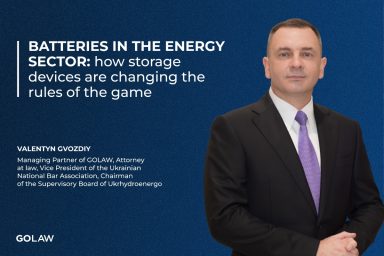Top Changes for Financial Institutions on Restructuring and Recoveries Market in Ukraine
One of the biggest fear for a creditor in providing financing is a possible default with zero perspectives to recover damages. On the international arena until recently Ukraine has been known as a high-risk country that precludes foreign investment flows. However, the situation has changed substantially over the past few years.
New Legislation on Protection of Creditor’s Rights and Interests was Adopted
In February 2019 the new Law “On Recovery of Lending” (hereinafter referred to as the Law) came into force. This Law introduces amendments to a number of laws and regulations, including the Law of Ukraine “On Banks and Banking Activity”, “On the Pledge”, “On the Mortgage”and the Civil Code of Ukraine.
The Law introduces a set of changes aimed at protecting interests of lenders and mortgagees. Among all the amendments, the most important are the following:
Reconstruction of the mortgaged property is no more the reason for mortgage termination
One of the common patterns used by unfair debtors to release the real property from the mortgage is mortgaged property reconstruction.
Due to the changes introduced by the Law, in case the mortgagor has reconstructed the mortgaged property, or has carried out unauthorized construction thereon (including construction of new buildings, structures etc. on the land plot owned or used by the mortgagor), all the reconstructed, newly created real property items are deemed to be the mortgaged property in accordance with the mortgage agreement.
These amendments are aimed at preventing the release of real estate from the mortgage, since the unfair debtors’ attempts to “save” their property from the mortgage by means of its reconstruction are quite common, unfortunately.
In such cases, mortgagees were forced to defend their rights in court, and it should be noted that courts basically satisfy their claims. In a similar case , while representing the interests of the bank , GOLAW proved in the court that all reconstructed items of real estate were also mortgaged to the Bank, despite the fact that it was a rather complicated and time-consuming process . After the amendments this procedure shall become easier and faster. At the same time, the new Law does not relieve banks of all difficulties caused by the reconstruction of the mortgage. As stated by several courts, this Law does not have a retroactive effect and does not apply to those reconstructions that were made before it’s entering into force. Whereas this statement is very disputable, we are sure that new case law shall be established.
Out-of-court foreclosure was simplified
New requirements to the agreement on satisfaction of the mortgagees’ claims or respective reservation in the mortgage agreement are established. In particular, now the parties to the mortgage agreement shall decide on acceptable and adequate ways to exchange notifications between them. Such minor change may have a crucial effect on the whole foreclose case in the end. Previously, it was directly stated by law that the lender become entitled to an out-of-court foreclosure only after 30 days from the receipt by the mortgagor of the lender’s written request for debt repayment. Usually, debtors evade the receipt of such lender’s notices, which allows the debtor to subsequently appeal from the foreclosure in court. In similar cases, in order to secure the rightsof the bank, GOLAW uses a special State Post Service that ensure the receipt of the notices by the debtor under any circumstances.
The above-mentioned amendments will finally put an end to that category of disputes. But many mortgage agreements currently in force do not prescribe the adequate methods for exchanging notifications between the parties. That means that the receipt by the mortgagor of the mortgagee’s written notice still must be duly confirmed.
Foreclosure on the collateral does not mean that creditor cannot recover the remainder of the debt
It is clearly prescribed by the Law that upon completion of the out-of-court settlement any subsequent claims of the mortgagee regarding fulfilment of:
- the principal obligation by the debtor being an individual are invalid, unless otherwise provided for by the mortgage agreement or loan agreement or agreement on satisfaction of the mortgagee’s claims;
-the principal obligation by the debtor being a legal entity or an individual entrepreneur are valid, unless otherwise provided for by the mortgage agreement or loan agreement or agreement on satisfaction of the mortgagee’s claims.Here we see the importance of a thorough analysis of the loan and mortgage agreement before their signing.
If the loan is secured by several mortgages, both court and out-of-court foreclosure of each of them is possible. These amendments were aimed at putting an end to many years of the controversial case law regarding the validity of the mortgagee’s claims upon the out-of-court foreclosure on the mortgaged property. In a similar case, GOLAW proved in the court that the bank still has the right to demand payment of the remaining part of the debt after the completed foreclosure on the major rick plant and land plot.
Lien on the mortgaged property is not an obstacleto foreclosure
Unfortunately, there are numerous cases when unfair debtors, which do not want to return the borrowed funds, try to establish a lien or any other encumbrance on the mortgaged property (liens within criminal proceedings are especially common) in order to prevent foreclosure on the property.
It is provided by newly adopted Law that any data in the State Register of Property Rights to Real Property on any encumbrances, restrictions, attachments or other bans on the mortgaged property upon the state registration of the mortgage are not a basis for denial of state registration of title to the real property in the name of the mortgagee being a bank.These amendments will finally enable lenders to foreclose on the pledged property with no hindrance and without having to waste years in courts revoking to numerous artificial attachments of the mortgaged property by the unfair debtors. In similar cases, in our practice, GOLAW cancelled such attachments in the court. Now, such arrests are not the barrier to registration of the title on the collateral in the name of the bank. Moreover, just after the Law came into force ,GOLAW proved to the state registrar that foreign financial institution also can take advantage of this provision.
Guarantee termination rules have been changed
A guarantee used to be terminated in case when the scope of the debtor’s liability was increased without the guarantor’s consent. There were lots of cases where bank lost the guarantee because of the credit rate or credit contract term increase without the guarantor’s consent. Recently these rules have been changed.
In particular, if the obligation is changed without the guarantor’s consent, which has resulted in an increase in the scope of the debtor’s liability, the guarantor remains liable for the debtor’s breach of the obligation but only to the extent existing before the change of the obligation.
Furthermore, it has been established that liquidation of the debtor being a legal entity does not terminate the guarantee as well as mortgage, if the lender has filed a claim against the guarantor/mortgagor to the court in connection with breach of the obligation by the debtor before the respective entry is made in the Unified State Register of Legal Entities, Individual Entrepreneurs and Public Organisations.2. Positive Changes in Bankruptcy LawOn 21 October 2019 the Bankruptcy Code of Ukraine (hereinafter referred to as the Code) will be enforced. The Code provides for a number of positive changes for lenders whose claims are secured by mortgage (they are called secured creditors).
Secured creditors are now a party to the bankruptcy case and they can initiate bankruptcy proceedings as well. The new legislation has greatly simplified the grounds for initiating bankruptcy proceedings. Previously, it was necessary to have a court decision on debt collection that came into force. By contrast, currently, the creditor may initiate the bankruptcy of the debtor if the latter does not fulfill its monetary obligations in time.
The debtor shall file its redevelopment plan as well as the debt restructuring plan for the approval of the creditors. Those creditors who disagree with those plans are entitled to recover the mortgaged property from the mortgagee regardless of the due date in our of bankruptcy procedure.
In case of sale of mortgaged property within bankruptcy proceedings, the money from such sale shall be directed to the repayment of secured creditors’ claims irrespective of the creditors’ claims satisfaction order.
Another important change is that secured creditors shall approve any reduction of the price at which the mortgage property is being sold at the auction. Such novelty will help to avoid manipulation with the price at the auction when related to the debtor persons may acquire the property at the minimal price.
Also secured creditors have the right to challenge the contracts entered into by the debtor after the bankruptcy proceedings have been opened, as well as the contracts concluded during the three years preceding the opening of the bankruptcy proceedings. The reason for the challenge may be, inter alia, that these agreements led to the debtor’s insolvency.
Appropriate Level of Foreign Investment Protection
In Ukraine, at the state level, a special attention is paid to the issue of protection of foreign investment. For example, the Business Ombudsman Council, which deals with business interests’ representation and protection in government bodies, has been operating since 2014. Its mission is to ensure the transparent conduct of business in Ukraine and to protect foreign investors from violations by public authorities. Cooperation with the Business Ombudsman Council has many times facilitated the prompt resolution of the disputes in favour of a foreign investor in the case of unjustified criminal proceedings, the arrest of investors' accounts, abuse by the court system, etc.In addition, there is an Investment Promotion Office (UkraineInvest) headed by the Government Investment Ombudsman. UkraineInvest was initially set up as an advisory body to the Government at the expense of donors (in particular, the Western NIS Enterprise Fund) but later it transformed into a government agency. UkraineInvest is aimed at providing investors with up-to-date information and recommendations on the peculiarities of doing business in Ukraine, as well as activities in the main sectors of the economy: agribusiness, manufacturing, energy, infrastructure, and innovative technologies. UkraineInvest also facilitates the executive authorities’ activities in solving the problematic issues which may arise when investing in the Ukrainian economy.
Related insights

01 July 2025 Energy Alert
Batteries in the energy sector: how storage devices are changing the rules of th...

30 June 2025 Publication
The most common mistakes made by employees during investigative actions at an en...

27 June 2025 Publication
The future of сryptocurrencies in Ukraine: what virtual asset holders should pre...
Sign up to be aware
New achievements are inspired by information. GO further, don’t miss out GOLAW news and legal alerts
Our expertise
-
- Antitrust and Competition
- Banking and Finance
- Compliance, Corporate Governance and Risk Management
- Corporate and M&A
- Criminal and White Collar Defence
- Defense in Anti-corruption procedures and regulations
- Labor and Employment
- Natural Resources and Environment
- Government Relations (GR)
- Insolvency and Corporate Recovery
- Intellectual property
- International trade
- Legal support of business and private Сlients in Germany
- Litigation and dispute resolution
- Private clients
- Real Estate and Construction
- Energy and Natural Resources
- Restructuring, Claims and Recoveries
- Martial Law
- Tax and Customs
-
- Agribusiness
- Aviation
- Chemical industry
- Engineering, Construction and Building Materials
- Natural Resources and Environment
- Financial institutions
- IT and AI
- Industry and manufacturing
- Healthcare industries, Life sciences and Pharmaceuticals
- Media, Entertainment, Sports and Gambling
- Retail, FMCG and E-Commerce
- Transport and Logistics
We use cookies to improve performance of our website and your user experience.
Cookies policy
Cookies settings




